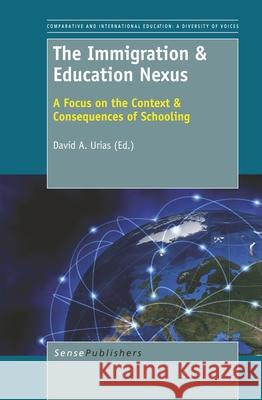The Immigration & Education Nexus : A Focus on the Context & Consequences of Schooling » książka
The Immigration & Education Nexus : A Focus on the Context & Consequences of Schooling
ISBN-13: 9789460918186 / Angielski / Miękka / 2012 / 278 str.
The Immigration & Education Nexus : A Focus on the Context & Consequences of Schooling
ISBN-13: 9789460918186 / Angielski / Miękka / 2012 / 278 str.
(netto: 177,65 VAT: 5%)
Najniższa cena z 30 dni: 180,57
ok. 30 dni roboczych
Dostawa w 2026 r.
Darmowa dostawa!
The focus of this edited volume is on immigration's effect on schooling and the consequential aspect of illegal immigration's effect. To understand immigration (legal and undocumented) and K-16 education in Asia, Europe, and the US is to situate both within the broader context of globalization. This volume presents a timely and poignant analysis of the historical, legal, and demographic issues related to immigration with implications for education and its interdisciplinary processes. Arguments based on theories of globalization, socialization, naturalization, and xenophobia are provided as a conceptual foundation to assess such issues as access to and use of public services, e.g., public education, health, etc. Additional discussions center around the social, political, and economic forces that shape the social/cultural identities of this population as it tries to integrate into the larger society. The long-term causes and consequences of global immigration dynamics, and the multiple paths taken by immigrants, especially children, wishing to study are addressed. Summary discussion concludes the volume as well as projections with respect to links between immigration and key national security and international policy issues. Education can and must play an important role in a world that is more global and at the same time more local than it was almost twenty years ago. This volume intends to serve as an ambitious guide to approaching the issues of immigration and education more globally.
The focus of this edited volume is on immigrations effect on schooling and the consequential aspect of illegal immigrations effect. To understand immigration (legal and undocumented) and K-16 education in Asia, Europe, and the US is to situate both within the broader context of globalization. This volume presents a timely and poignant analysis of the historical, legal, and demographic issues related to immigration with implications for education and its interdisciplinary processes. Arguments based on theories of globalization, socialization, naturalization, and xenophobia are provided as a conceptual foundation to assess such issues as access to and use of public services, e.g., public education, health, etc. Additional discussions center around the social, political, and economic forces that shape the social/cultural identities of this population as it tries to integrate into the larger society. The long-term causes and consequences of global immigration dynamics, and the multiple paths taken by immigrants, especially children, wishing to study are addressed. Summary discussion concludes the volume as well as projections with respect to links between immigration and key national security and international policy issues. Education can and must play an important role in a world that is more global and at the same time more local than it was almost twenty years ago. This volume intends to serve as an ambitious guide to approaching the issues of immigration and education more globally.











